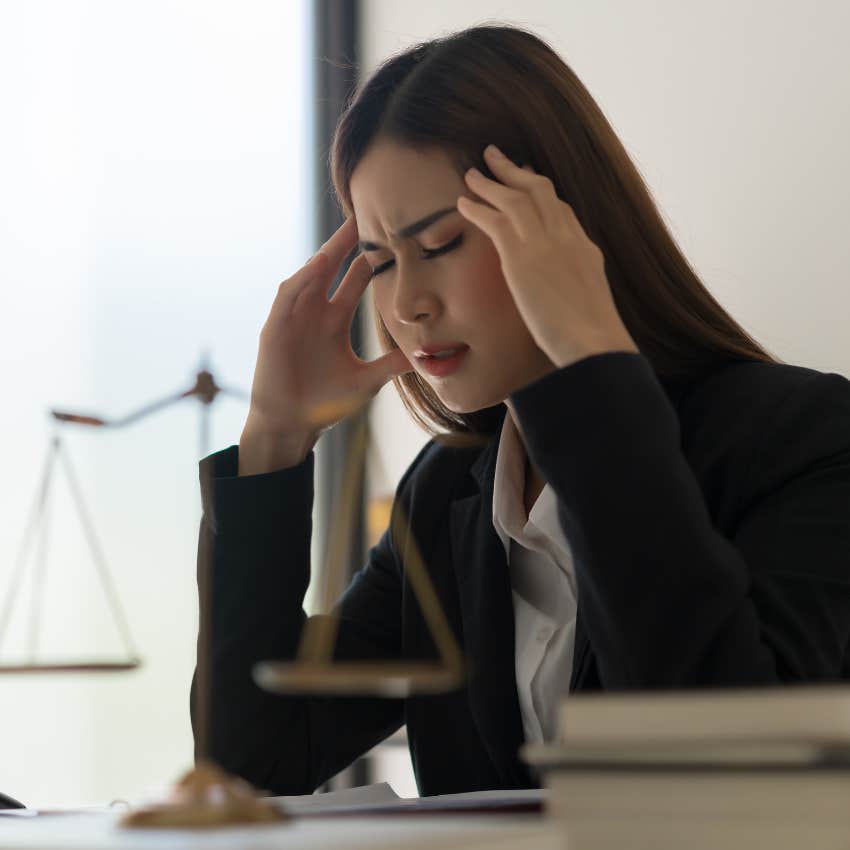Lawyer Explains Why His Profession Is ‘One Of The Most Dangerous Jobs In America’
The profession is often incredibly damaging to one's mental health.
 Gorodenkoff | Shutterstock
Gorodenkoff | Shutterstock Working as a lawyer is no easy feat. Not only do they have long and often unpredictable hours, but they often must deal with the emotional toll of their clients and the stress of court cases.
While the profession certainly has its benefits, including an impressively high salary depending on the area of law, it doesn't always seem to be enough — at least for one lawyer in particular.
New York-based personal injury attorney John A. DeGasperis insisted that law is not a profession that should be taken lightly. He admitted that there are serious repercussions to working as an attorney, especially when it comes to their overall well-being.
The lawyer explained why his profession is 'one of the most dangerous jobs in America.'
"I'm gonna make a bold statement, but I think the statistics support this claim," DeGasperis began his TikTok video. "Being a lawyer is a dangerous job. In fact, I think it's one of the most dangerous jobs in America."
He explained that he's come to this conclusion based on the poor mental health that many lawyers experience because of the profession. Between high levels of anxiety, depression, suicidal thoughts and/or actions, and poor physical health, lawyers tend to fall on the lower end of the scale when it comes to taking care of themselves.
Findings from two 2016 studies by the American Bar Association revealed high rates of substance use and mental health disorders among law students and lawyers. Polling 3,300 law students from 15 law schools, the survey found that 25% of law students are at risk for alcoholism, 17% of law students suffer from depression, 37% of law students report mild to severe anxiety, and 6% of law students reported having suicidal thoughts.
More than 13,000 working lawyers also responded to a survey, and results showed that 28% of lawyers suffered from depression, 19% of lawyers had severe anxiety, and 11.4% of lawyers had suicidal thoughts.
The profession is so damaging, both mentally and physically, that lawyer-specific hotlines are available.
"The New York State Bar Association, for example, has a helpline," DeGasperis said. "Lawyers take their own lives; they get divorced at a relatively high statistical rate. It's a very stressful job, and many lawyers are small business owners, whether they acknowledge it or not."
He further claimed that many lawyers constantly carry their clients' troubles, particularly emotional ones. When you represent someone who is injured or has gone through an unspeakable act, it's difficult not to absorb their emotional distress, especially if you are passionate about the cause. Doing that every single day, client after client, inevitably takes its toll. It's why lawyers are known to suffer from substance abuse issues.
 Indypendenz | Shutterstock
Indypendenz | Shutterstock
DeGasperies explained that he was sharing this information because he was currently on vacation with his family, and despite the beautiful location and serene environment, he struggled to disconnect from work.
"It's in the silence that I'm running more than ever, that my mind is racing," he said. "For me, I have very good mental health. I have a very supportive family. I love my work, so I'm one of the fortunate ones. I feel like I can shoulder the stress and all of the responsibility that comes with representing so many different injured people."
While DeGasperies has been blessed with a support system and is able to compartmentalize the cases and clients he's responsible for, not everyone is allowed the same luxury. That's why it's crucial for lawyers to prioritize their self-care.
Whether it's going on a vacation after a difficult case or turning off your work phone when you're not in the office, you must take time for yourself. Just like any other job, if you constantly work without taking a break, eventually you will burn out — it's not if, but when.
If you or someone you know is in emotional distress, reach out 24/7 to the 988 Suicide and Crisis Lifeline by dialing or texting 988 or using chat services at suicidepreventionlifeline.org to connect to a trained crisis counselor.
Nia Tipton is a Chicago-based entertainment, news, and lifestyle writer whose work delves into modern-day issues and experiences.

